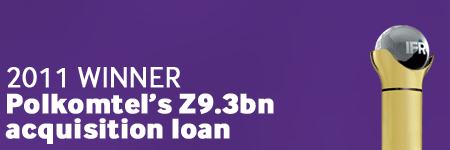EMEA Leveraged Loan
Well Polished: Polish mobile phone company Polkomtel was not only the largest LBO financing in Europe since 2008, it navigated uncharted waters as the biggest ever zloty-denominated financing raised for a Polish buyout. For successfully executing a unique and complex buyout in volatile markets, Polkomtel’s Z9.3bn acquisition loan is IFR’s EMEA Leveraged Loan of the Year.

Zygmunt Solorz-Zak, Poland’s second-richest man, had been eyeing Polkomtel – the country’s second-largest mobile operator – for some time. He already owned other telecoms and media businesses, including Poland’s largest listed media group Cyfrowy Polsat, and saw buying Polkomtel as an opportunity to achieve synergies across his companies.
Solorz-Zak won the auction for Polkomtel on June 30 2011 with a Z18.1bn (US$5.5bn) bid, which was backed by a €1.6bn-equivalent leveraged loan, a €1.9bn-equivalent bridge to high-yield bonds and PIK facilities with several unusual characteristics.
Credit Agricole and Deutsche Bank initially underwrote the deal, which was Europe’s largest LBO financing since 2008 and Poland’s biggest ever zloty-denominated buyout financing, on a joint 50/50 basis. They were then joined by Royal Bank of Scotland and Societe Generale as bookrunners and Poland’s PKO BP as a mandated lead arranger when Solorz-Zak won the bid.
Syndication of the loan started almost immediately and faced the twin challenges of a summer launch and deteriorating sovereign debt markets. The deal was not a traditional leveraged loan – which is typically syndicated to institutional investors – and the task was to raise as much zloty liquidity as possible.
The arranging banks had to rely on domestic banks as many CLO funds are restricted from investing in Polish credits.
“Both the buyer, Mr Solorz-Zak, and Poland did not fit the mould of the traditional LBO,” said Nick Jansa, head of European loans and high-yield at Deutsche. “The different jurisdiction and currency made it more complicated to structure the deal. The key was to understand and estimate how much local liquidity there was available for this deal.”
The deal was hugely successful, despite the deteriorating macroeconomic picture. A €450m carve-out on the term loan B was originally targeted at European institutional investors, but saw significant appetite from local banks and international banks with Polish subsidiaries for the zloty tranches.
Poland’s economy has been growing more quickly than Western European peers and is a competitive market after many privatisations. Moreover, Poland has plenty of “trapped liquidity” as many of its foreign-owned banks have zloty deposits to invest locally.
When the books closed, the loan was nearly twice oversubscribed and was increased by €300m-equivalent to €1.9bn. After a bank-only syndication, the euro carve-out was reduced to just €118m.
“The amount of zloty liquidity there was in the end surprised us all,” said Michael Sheren, head of leveraged finance credit at Credit Agricole.
While other LBO loans were hit by August’s volatility and had to flex up by as much as 500bp, with 2% discounts, Polkomtel allocated its term loan B at 450bp with no discount.
Increasing the loan by €300m allowed the banks to reduce a bridge loan to a secured bond by the same amount. The banks were still exposed to €1.7bn-equivalent of bridge facilities in September and October, however, when the high-yield bond market was closed.
Knowledge of the strength of demand for the loan allowed the arrangers to successfully convert a Z1.75bn secured bond bridge into a new term loan C in October, which allocated in November.
The arrangers also managed to sell a €352m PIK note privately. Some was sold to the European Bank for Reconstruction and Development – an unconventional move as the EBRD usually invests in projects that could not otherwise attract financing.
“We decided we would rather have [the EBRD] as part of the financing than any fund, as funds have other goals. They tend to exit at some point and we want progress for Polkomtel,” Solorz-Zak said in August.





